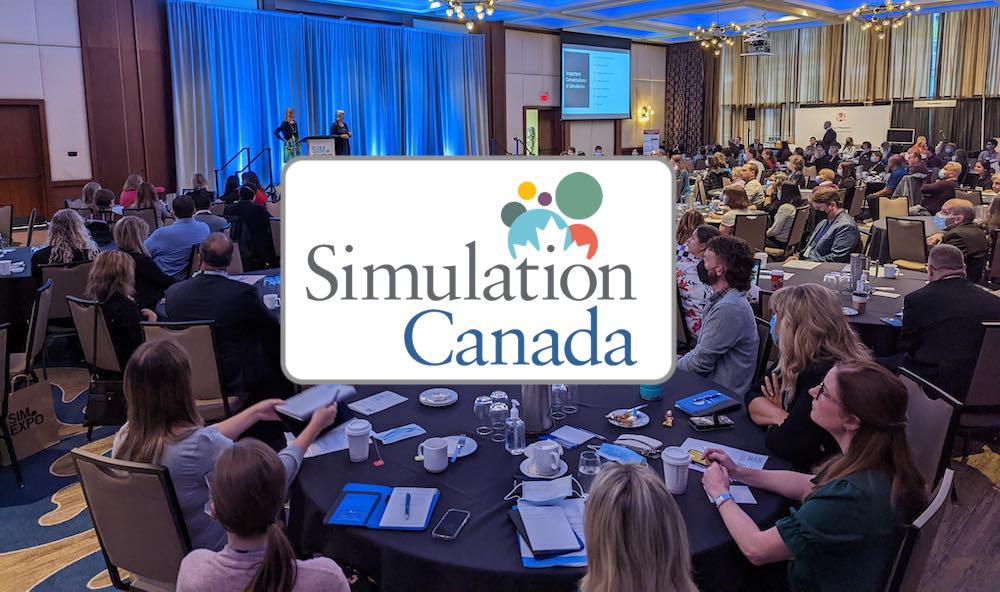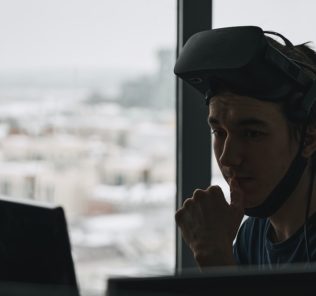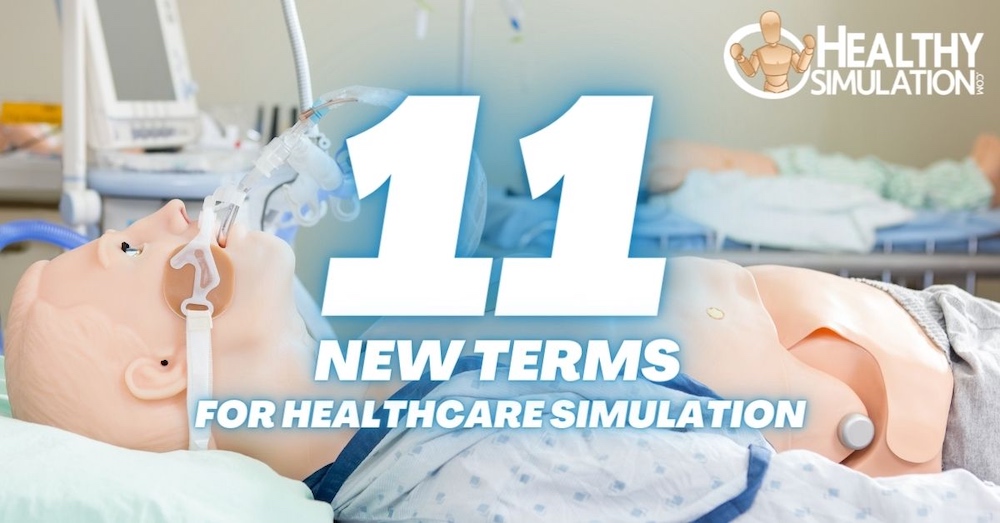Simulation Canada Sim Expo 2022 Provides Real Impact to Global Audience
This year the Simulation Canada Sim Expo 2022 event is finally back in person following the COVID pandemic in Toronto, Canada with hundreds of Healthcare Simulation champions from around the world coming together for two days of key addresses, workshops, networking events, product demonstrations, and more. HealthySimulation.com Founder/CEO Lance Baily was on hand to capture the event in this article, as well as to sign an ongoing Media Partnership with the non-profit organization for continued support for years to come.
Reflecting on the first in-person Sim Expo event since the pandemic, organization President and CEO Dr. Timothy Willett exclaimed, “How good it feels to be personally reconnecting with members of this amazing community!” He added that “we recognize the incredible creativity and commitment simulationists have shown and supported during the pandemic – and we are so excited to be back together with them and looking towards the future once again.” Regarding the new media partnership with HealthySimulation.com, he shared that “Simulation Canada has seen the great impact HealthySimulation.com has provided with connecting the healthcare simulation community globally across professions and sectors, and are excited to work together to collaborate to bring more of us together to share our amazing resources with the world.”
After Dr. Willett’s introduction to the Sim Expo 2022 event, he announced the opening keynote address “New Frontiers: Important Conversations in Simulation Right Now” by Sandra Goldsworthy Ph.D., RN, CNCC(C), CMSN(C), CCSNE, Professor at the School of Nursing and Teaching Chair for Online and Virtual Experiences at Nipssing University and Margaret Verkuyl MN, NP: PHC, Professor of Nursing at Centennial College.
Sponsored Content:
Sandra and Margaret brought up key questions and topics relevant to the future of Clinical Simulation practice, including “Should we replace some clinical practice with simulated learning?”, “How can we implement the latest AR/VR technologies?”, and “How do we embed medical simulation into our curriculum?”
Sandra reflected that technology is moving faster than the faculty can keep up with, and warned we have to be careful to continue to ensure we effectively embed learning technologies into the curriculum. Margaret suggested that we need the strategic integration of healthcare simulation, with systemic reviews of simulation uses across the program on a regular basis, to ensure a comprehensive utilization that eliminates redundancies and maximizes effectiveness. She continued by sharing that there is a growing body of evidence in support of extended reality (XR) technologies playing an integral role in clinical development, because of the ability to hit the “reset” button and practice experiences infinitely – unlike physical simulation which time, space and people limitations. Margaret concluded that analytics from digital training will be crucial to improving the impacts of our learning, both at an individual and institutional level.
Margaret reminded the audience about the Free Educator’s Toolkit for Virtual Simulation which was developed as a resource to help clinical educators and simulationists use virtual simulations with learners in all educational settings. The free online book is designed to highlight key concepts related to educator preparation, prebrief, enactment, debrief and evaluation stages required for providing an effective virtual simulation learning experience. The foundational information in this textbook will benefit any educator who is using virtual simulation in a course, lab, clinical setting or to augment practice.
Both presenters emphasized the importance of collaboration to the success of a simulation in a healthcare program and welcomed participants at the 2022 Sim Expo conference to network with each other for the betterment of ourselves and our community.
Sponsored Content:
Additional Sessions Taking Place This Week at Sim Expo 2022 Include:
- Interprofessional Education in Simulation: Integration of the CIHC Competencies for Patient-Centered Collaboration
- Communication Skill Training: Learning to Hold Difficult Conversations Virtually
- Critical Dialogues for Action: Unlearning and Relearning through the -isms and -phobias
- High Quality Simulation Design in 11 Easy Steps!
- Embedding Equity, Diversity, and Inclusion (EDI) into Simulation Scenarios
- Simulation to Assess for Collective Competence
- The Development of 360 Virtual Interactive Puzzle Escape Rooms (VIPERs)
- Learn the Basics of Digital Design, 3D printing, and Additive Manufacturing Techniques to Create Cost-effective Simulators
- The Art of Scripting a Simulation Scenario
- And many more!
Additional Presentation Recaps
Elizabeth Horsley RN, MSMS, CHSE, and Yvonne Galbraith helped steer a session on the use of clinical simulation in hospital settings. Demonstrations of the kinds of support that the Simulation Canada organization has and can provide were covered – which includes online courses and expert consultation of advice. Important to note, Dr. Williett had earlier in the day remarked that the 2022 event had the most representation from professional care institutions than any previous event, highlighting the growth of clinical simulation beyond academic settings.
On Tuesday, Saroo Sharda MBChB, MMEd, FRCPC, Faculty at the Department of Anesthesia at McMaster University, provided the plenary address “Intent, Impact, Harm and Action: Understanding Bias, Discrimination and Racism in Healthcare and Simulation”. She covered key considerations regarding the background of the current literature and understandings regarding racism and bias, sharing research that showed a 30% increase in patient death among indigenous people during surgical procedures in Canada (McVicar et al). She also pointed to research from “Patients, Pride, and Prejudice: Exploring Black Ontarian Physician’s Experiences of Racism and Discrimination” (Mpalirwa et al) in 2020 where physicians regularly experienced patients refusing to accept their diagnosis until a caucasian Doctor provided the same information.
Dr. Sharda shared simulation experiences which included micro-aggressions of racism to provide clinicians with the opportunity to respond. Her experience is that simulationists are keen to include opportunities for Diversity, Equity, and Inclusion (DEI) into simulation, but recommends careful consideration first. She reminds us to reflect on the structures which provide advantages for one group over another so that our simulation experiences cover both sides of the coin – disadvantages for some, and as well, advantages for others. Saroo asks us to first unlearn, then to listen, reflect and finally act – focusing on inclusion and consideration prior to the installation of DEI into our medical simulation scenarios.
Leading Medical Simulation Vendors in Attendance
In the exhibition spaces were several leading medical simulation vendors including CAE Healthcare, Education Management Solutions, Echo Healthcare, TacMed Solutions, Spectrum Nasco Healthcare, Simulab, Pocket Nurse, Gaumard, Laerdal, nVRse, Limbs & Things, and more. All of these innovative companies showcased their latest clinical simulation technologies, including high-fidelity patient simulators, virtual reality trainers, immersive rooms, auscultation manikins, clinical task trainers, trauma simulators, surgical simulators, audio video recording systems, analytics capture systems, and more!
More about Simulation Canada
Simulation Canada is Canada’s interprofessional, cross-sector, nonprofit network for the advancement of simulation in healthcare and beyond. They connect the national and international healthcare simulation community, facilities, and resources across Canada and link to national and international stakeholders. The non-profit advocates for and advances simulated learning in education and in practice for the benefit of patient care and safety.
Join them to engage with our passionate community (3000+ simulationists and 150+ institutions), contribute to the advancement of simulation, receive discounts on our events, courses, and services, connect with our community and experts, receive exclusive news, notices and tips, access grants and funding opportunities, and more.
They also offer professional development and simulationist certification, including the nationally-recognized Keystones of Simulation certificate program, as well as host a number of free, online services that are open to educators across the globe. This includes the SIM Scenario Exchange for peer-reviewed simulation scenarios and tools, the SIM Marketplace for the buying and selling of gently-used simulation equipment, the SIM Company Directory, and more. Finally, beyond the Sim Expo event, they also host the National Forum on Simulation for Quality and Safety.
Simulation Canada Resources:
- Developed as part of the Virtu-WIL Project, a Colleges and Institutes Canada initiative, 137 virtual simulations are currently accessible through Simulation Canada’s website, a key partner on the project. The virtual simulations are designed to give nursing, medical laboratory sciences, and paramedicine learners innovative hands-on training experiences.
- Simulation Canada also provides “The Exchange,” a repository of free resources, including simulation scenarios, links to virtual simulations, scenario development tools & templates, and assessment/evaluation tools.
- Additionally, the organization’s SIM Marketplace is a virtual platform to buy, sell, rent, and share healthcare simulation products.
- Other healthcare simulation resources include COVID-19 Simulations, virtual SIMS, SIM Journals, and ongoing tips.
Learn More About Simulation Canada
Lance Baily, BA, EMT-B, is the Founder / CEO of HealthySimulation.com, which he started in 2010 while serving as the Director of the Nevada System of Higher Education’s Clinical Simulation Center of Las Vegas. Lance also founded SimGHOSTS.org, the world’s only non-profit organization dedicated to supporting professionals operating healthcare simulation technologies. His co-edited Book: “Comprehensive Healthcare Simulation: Operations, Technology, and Innovative Practice” is cited as a key source for professional certification in the industry. Lance’s background also includes serving as a Simulation Technology Specialist for the LA Community College District, EMS fire fighting, Hollywood movie production, rescue diving, and global travel. He and his wife live with their two brilliant daughters and one crazy dachshund in Las Vegas, Nevada.
Sponsored Content:


















